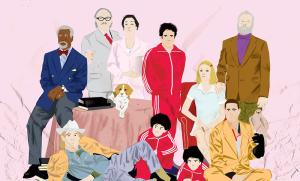
Source: Flicker user Brian
License
Children of the pre-streaming era, post-cable era have their own special collections. Not only would you get the same commercials all the time but you’d see the same movies too. Occasionally, there was a treat. Something unexpected would slip in, split your head like a watermelon, and expand your world. Mostly, however, you got Bloodsport (1988) and Half-Baked (1998). If you were really lucky, the bigwigs beamed a transfixing picture show into your bloodshot eyeballs with regularity. I was so lucky. The film was Wes Anderson’s The Royal Tenenbaums (2001).
I’d never seen a woman like Gwyneth Paltrow’s Margot before. Blonde hair, thick eyeliner, a smoker. My mom smoked—perhaps that had something to do with it. I found Margot entrancing, worship worthy, and utterly repulsive all at the same time. Her flat affect conveyed mystery. Everyone’s total nonchalance did. The colors were bright; the mustaches and beards glorious in a time before Urban Outfitters, axe-throwing bars, and a revival of trad Catholicism had reified each into cliché. The Royal Tenenbaums had a quiet dignity I wasn’t getting from Chuck Norris pictures. I don’t think the movie contains the word “bemused,” and yet I am sure Anderson’s movie beamed it directly into the cellular structure of my brain.
I decided to rewatch The Royal Tenenbaums as an adult because more recent Anderson fare has left me wanting. Artifice has smothered those moments (like Luke Wilson’s suicide attempt) that moved me even as a child who understood little about death, drug addiction, attraction to one’s stepsister, or any other number of adult problems. I wanted to discern if anything had changed. If so, what?
As I took it in, I couldn’t stop thinking of R.W. Fassbinder’s Love is Colder than Death (1969), a gangster film intentionally shot statically, rigidly. Fassbinder’s obsession with Brecht coats the screen. It’s not a good movie. What it does, however, is force the viewer to consider urgently the relationship between form and content. Are gangsters still cool when we don’t match the camerawork to their outbursts of violence? Do we look up to them, glorify them, when they march into and out of frame in stony ridiculousness?
Anderson’s style, I fear, has come unanchored from the stories he seeks to tell. Tenenbaums is indeed “twee” or “weird” or whatever other nebulous term we’d like to use. These words sell it short, though. The deadpan tone offers Anderson a way to navigate the fine line between comedy and tragedy, between a family so broken it can barely function and so dysfunctional it can’t help but lead us to break out in laughter. It softens the rough edges of disappointment, even as it highlights the bizarre mannerisms found among wealthy failures, nepo babies, and retired gifted kids. Anderson’s style and tone are humanizing. Above all, he’s not afraid—as when Ben Stiller rushes his boys outside for a home fire drill—to use a handheld camera, to subordinate the artifice to the emotional purpose of the narrative, to let one shape the other and be shaped in turn.
I liked The Royal Tenenbaums. A decade away left me with much to appreciate, even if it lacks the hypnotic quality that first drew me in (being about the age of the Tenenbaum children doesn’t help). Above all, I was left thirsting, doubting, waiting—bemused. What happened, Wes?













